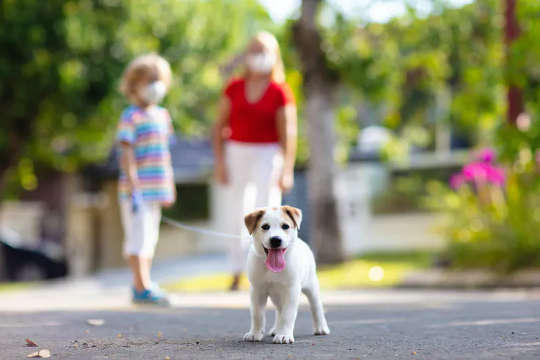
As the pandemic drags on, people’s desire for puppies continues to grow. (Shutterstock)
At first, it was toilet paper and hand sanitizer. People stuck at home with time to bake bought up all the flour. Next came the terrifying shortages of hospital ventilators and ICU beds, and eventually vaccines.
Then came the dogs.
Yep. A dog shortage. Yet, they are everywhere. Parks are full of them. Shelters are empty. Adoption rates have risen 30 to 40 per cent and foster organizations cannot keep up with the demand.
Wait lists for breeders are years long and vets are booking appointments months in advance. In the United Kingdom, a torrent of dog-napping cases are being touted as the work of a “puppy mafia.” The always pervasive problem of puppy mills and scams are thriving as people pine for puppies.
Get The Latest By Email
Dogs are a huge part of my life. As an associate professor of anthrozoology, I attend yearly anthrozoology conferences which feature some of the best dog-minds in the world. Early in my career I did a dog-training apprenticeship, with Huckleberry, my Labrador puppy, when reward-based training was on the rise. I also teach a course on dogs and humans’ relationship with them. I even met my husband while walking my dog.
The rush for dogs
The frenzy makes sense. People who chose to not have a dog because they were away for long hours are suddenly able to since school and work now happen at home. And for many, this may be permanent.
It may actually be beneficial to work alongside your dog. Research shows increased productivity and work-life balance, areas colleagues and I are collecting data on to further explore. At the very least, many new owners now have the time bond with, and train, their new family member — they’ve found a crack of light in the pandemic wall.
But bringing a new pup into the house is not always a good idea, as appealing as it may be for those feeling trapped at home during lockdown.
Dogs offer a breath of fresh air, and are one of the few permissible excuses for people to escape the indoors. When lockdowns began, amusing stories surfaced of desperate people walking stuffed dogs, fake dogs and even spouses on leashes. Now, borrowed dogs and even rented dogs are a thing.
Sadly, though, most new puppies will not get walked enough, and the many unexpected issues that lead to behavioural problems will contribute to frustrated owners and relinquishment.
Dog ownership is a huge responsibility
Knowing a lot about dogs is stressful because I zero in on problems. I sometimes cannot help myself from telling strangers that their new unvaccinated puppies shouldn’t be in a dog-crowded park. I cringe at exasperated owners yanking on choke chains, or using other types of punishment and outdated training methods because their frustrated dogs just want to run and play.
There is already a rise in dog surrenders. This is due, in part, to impulse purchases of pandemic puppies. Not surprisingly, people are lonely.
But we’re not sure dogs can cure loneliness. Anthrozoologist Hal Herzog says “the evidence just is not there.”
Herzog’s skepticism is understandable, and he maintains that the results are not conclusive. “Contrary to the claims of the pet products industry,” he says, “the vast majority of studies indicate that pet owners are no less lonely” than non-owners.
 Sadly, most new pandemic puppies will not get walked enough. (Shutterstock)
Sadly, most new pandemic puppies will not get walked enough. (Shutterstock)
Lack of socialization
A major concern among canine researchers is that pandemic puppies are not being socialized, which is vital to the future behaviour and emotional well-being of dogs. Typically, very few owners actually formally enrol in training or puppy classes, which are ideal for developing socializing skills. Presumably, lockdown would worsen this situation for puppies.
James Serpell agrees that this could create “a bit of an epidemic.” Serpell directs the Canine Behavioral Assessment and Research Questionnaire (C-BARQ) project at the University of Pennsylvania. C-BARQ is an online survey tool that provides owners with an evaluation of their dogs’ temperament and behaviour. So far, it has yielded standardized information about the behavioural norms of purebreds and mixed-breeds for more than 60,000 companion dogs.
While getting a puppy is a rational impulse, Serpell points out several potential problems for unsocialized puppies:
-
Some dogs may become fearful of new experiences, leading to increased aggression toward both unfamiliar dogs and people.
-
Dogs who are not used to being alone may develop separation anxiety, leading to destructive behaviour, including peeing and pooping inside the home.
-
And, of course, relinquishment. Today’s puppies could become tomorrow’s shelter dogs.
Serpell also points to an ironic paradox: “Any puppy acquired during the pandemic, if the owners were behaving responsibly, would not be properly socialized.” In other words, people who respect the social order may raise dogs who do not.
A society of pet lovers
But what about the “pet effect,” the theory that pets are good for us? After all, research findings show that the presence of dogs lowers blood pressure, reduces stress and improves emotional well-being.
Herzog has repeatedly raised red flags about this, suggesting a bias in anthrozoological research. This concern is shared by Dog Sense author John Bradshaw, who points out that although some studies do show positive health effects, the same number conclude “that pets have no or even a slight impact on health.”
But does science really matter?
After all, we are a society of pet lovers, with almost 60 per cent of Canadian households having a resident dog or cat. It’s often a simple pleasure to share the constant company of a nonjudgmental companion offering unconditional love. I have been thankful that the pandemic has given me more time with Grasshopper, my 13-year-old Labrador (who is perfectly behaved, of course).
Arguably, this article reflects the downside of my academic life and preoccupation with research, data, facts and theories about dog ownership. Sometimes, a dog is just a dog.
And in this case, I think it’s best to just let sleeping dogs lie.![]()
About The Author
Beth Daly, Associate Professor of Anthrozoology, University of Windsor
books_pets
This article is republished from The Conversation under a Creative Commons license. Read the original article.







